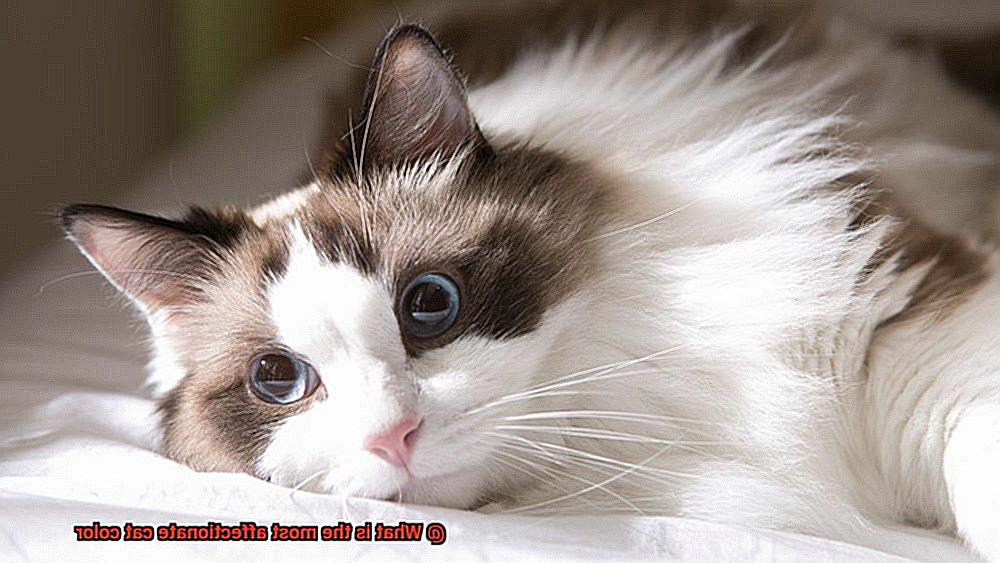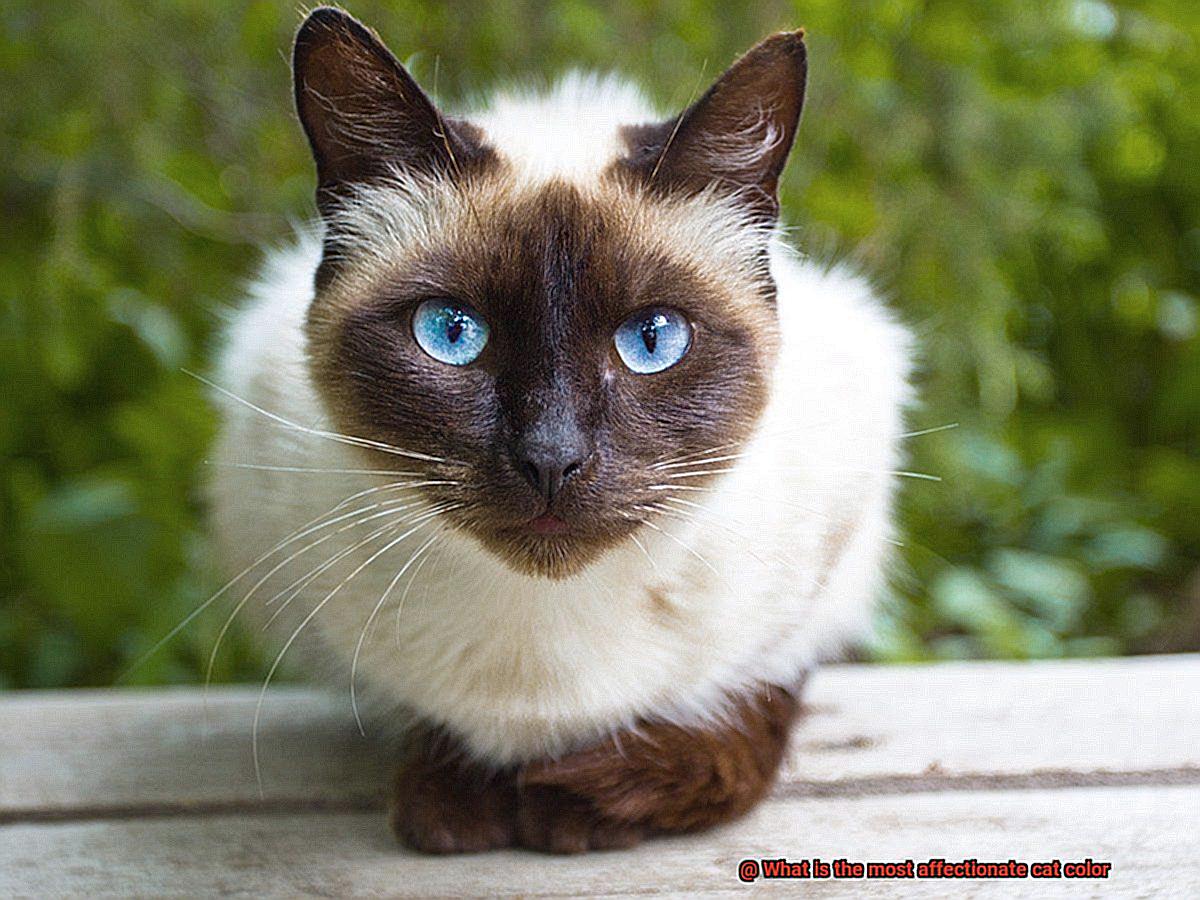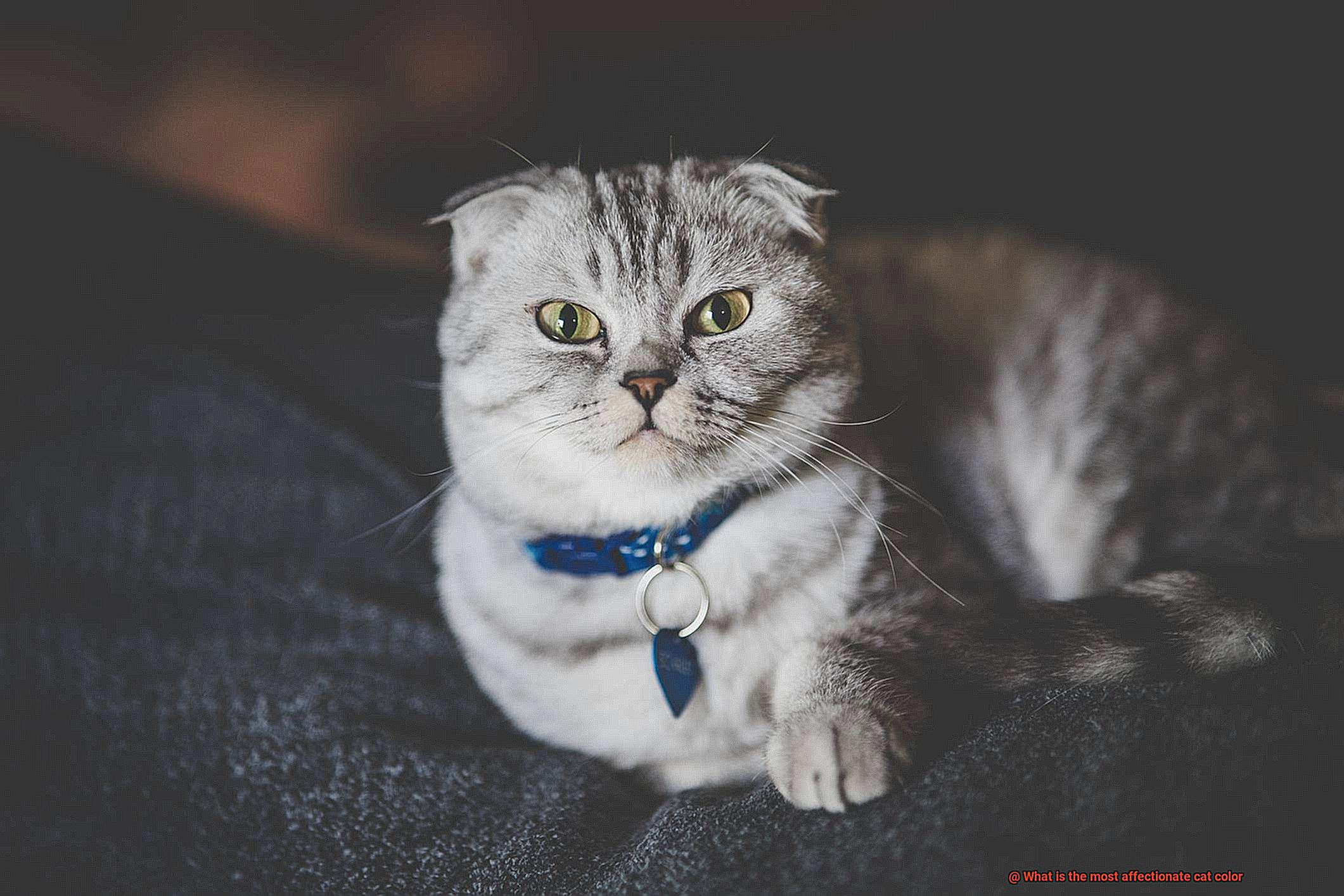As a self-proclaimed cat enthusiast, I’ve spent countless hours observing and analyzing feline behavior. One question that has always piqued my interest is whether certain cat colors are more affectionate than others. It may sound like a far-fetched idea, but research has shown that a cat’s coat color can actually play a role in their personality.
So, what exactly is the most affectionate cat color? This age-old question has been debated by cat lovers for years. Some argue that black cats are the friendliest due to their reputation as loyal and loving pets. Others point to calico cats with their striking coats and often-spirited personalities. But is there any scientific evidence to support these claims?

In this blog post, we’ll take a deep dive into the world of feline fur colors and explore how they impact a cat’s behavior. From orange tabbies to tortoiseshell cats, we’ll examine some of the most popular coat colors and determine whether there’s any truth behind the notion that certain colors are more affectionate than others.
Whether you’re a devoted cat owner or simply curious about these captivating creatures, join me on this journey as we uncover the mysteries of feline behavior and help you understand your own furry friend’s unique personality traits. So sit back, relax, and let’s embark on an adventure into the fascinating world of the most affectionate cat color together.
Affectionate Cats
It’s important to note that the level of affection a cat displays can vary depending on its breed and personality. However, there are certain traits that are commonly associated with an affectionate cat. These include their love for human companionship, their desire for physical touch and attention, and their unwavering loyalty to their owners.
If you’re curious about which breeds are known for their loving nature, the Siamese, Ragdoll, Persian, and Maine Coon are some of the most popular choices. These breeds are often described as friendly, social, and affectionate towards their owners.
But what about coat color? While some people may have personal preferences for certain colors such as black or white cats, this does not necessarily indicate a more affectionate cat. A cat’s personality is not determined by its coat color, so it’s important to focus on their behavior towards humans instead.
Ultimately, the best way to find an affectionate cat is to spend time with potential pets before making a decision. Observe how they interact with you and see if they seek out your attention and physical touch. Remember that each individual cat has its own unique personality and may exhibit affection in different ways regardless of their coat color or breed.

What Colors Are Most Affectionate?
Among the colors associated with affectionate cats, ginger cats are perhaps the most well-known. Also known as marmalade or tabby cats, these orange-coated felines are believed to have a sweet and friendly nature. They’re social creatures who love spending time with their humans, making them ideal pets for those seeking a loving and affectionate companion.
Another color that’s thought to be associated with affectionate cats is white. These gentle and calm felines tend to be very affectionate with their owners. They’re also known for being very vocal, so if you’re looking for a chatty and loving pet, a white cat might be the perfect choice for you.

While black cats are often associated with mystery and occasional foreboding, they’re also known for their loyalty and devotion. Black cats make great companions due to their intelligence and curiosity. They’re also quite affectionate towards their owners, making them an excellent choice for those seeking a loving and intelligent pet.
It’s important to remember that every cat is unique, regardless of its color. Personality traits can vary greatly from one cat to another, even within the same breed. So it’s best to spend time with different breeds and colors until you find the perfect match for your lifestyle and personality.
Orange or Ginger Cats
Look no further than orange or ginger cats. Known for their loving and social nature, these cats make excellent furry friends for those seeking a cuddly companion.
It’s not just hearsay; scientific research has shown that the gene responsible for their orange coat, the O gene, is linked to their friendly personality. The O gene produces the pigment that gives them their warm coat and has also been associated with the production of serotonin – a neurotransmitter that regulates mood and behavior in both humans and animals. So, it’s quite possible that this gene contributes to their loving personality as well.
But genetics isn’t the only factor at play here. Orange cats are naturally curious creatures who love to explore and interact with people. Their outgoing nature makes them more comfortable around new faces than other cats, which is a testament to their social aptitude.
While genetics and personality traits may contribute to their amiability, it’s worth noting that every cat has its unique personality. Some orange cats may be more reserved, while others are outgoing and affectionate. However, on average, orange or ginger cats are known for being some of the most loving and social felines out there.
Black Cats
When it comes to cats, black felines often get a bad rap. They’re seen as mysterious and even spooky, but did you know that these sleek creatures are actually incredibly affectionate? In fact, some people believe that black cats are even more loving and loyal than other cat breeds.

So, what makes black cats so special? For one, they form strong bonds with their owners. They love nothing more than spending time with their human companions and will often follow them around the house or curl up in their lap for a snooze. Plus, their playful and curious nature makes them fantastic companions for both adults and children alike.
But there’s something else that sets black cats apart from the rest. Experts believe that these felines have a unique gene that makes them more sociable and outgoing than other cats. This may also be responsible for their strikingly shiny coats, which stand out in a crowd.
Despite all of this, black cats sometimes get a bad rap. Some people associate them with bad luck or witchcraft, leading to mistreatment or fear. But in reality, black cats are just as deserving of love and affection as any other cat breed.
Factors That Could Influence a Cat’s Level of Affection
Some cats are irresistible cuddlebugs, while others prefer to keep their distance. But what factors influence a cat’s level of affection?
Let’s start with breed. While all cats are capable of affection, some breeds are known for being more loving than others. For example, Siamese and Persian cats tend to be highly sociable and crave human interaction. Their genetic makeup and temperament play a significant role in their friendly nature.
Age is also a factor in a cat’s level of affection. Kittens are usually full of energy and love to play, while older cats may be more laid-back and enjoy snuggling up with their owners. However, each cat has its own personality, so these generalizations aren’t always accurate.
Past experiences can influence a cat’s level of affection as well. If a cat has had positive experiences with humans in the past, they’re more likely to seek out affectionate contact. Conversely, if a cat has been mistreated or neglected, they may be more wary or aloof.

The environment in which a cat lives can also affect their level of affection towards their owner. Cats that grow up in a nurturing home environment with plenty of social interaction are more likely to seek out human companionship. On the other hand, cats that have been mistreated or neglected may be more hesitant to trust humans.
Finally, individual personality plays a significant role in a cat’s level of affection. Just like people, cats have unique temperaments that can range from outgoing and friendly to introverted and shy. Understanding your cat’s personality can help you build a strong bond with them based on mutual respect and trust.
Personality Traits
It’s important to consider their personalities, which can be influenced by a variety of factors, including breed, age, and even coat color.

While there’s no one specific color that guarantees an affectionate cat, some owners report that calico cats tend to be more loving and interactive. This might be because they’re often female, and females are generally more affectionate than males.
Black cats are also known for their affectionate personalities. They’re often referred to as “velcro cats” because they love to stick close to their owners. Many black cats are social and enjoy interacting with both humans and other animals.
If you’re looking for a gentle and calm cat, consider one with a lighter shade of gray. These cats are often described as cuddly and enjoy spending time with their humans.
Tabby cats are outgoing and love attention. They’re playful and enjoy being around people. However, keep in mind that these generalizations don’t apply to all cats of a certain color. Each cat has its own unique personality and temperament that should be taken into consideration when adopting a new furry friend.
Breed
Each breed possesses its own unique personality traits, from the snuggly Siamese to the laid-back British Shorthair. However, it’s essential to understand that a cat’s breed doesn’t necessarily determine its level of affection towards humans.
Take Siamese cats, for example. Renowned for their outgoing and social nature, they’re often considered one of the most affectionate breeds around. But while many may be cuddly with their owners, some may be more aloof and independent. The same is true for other breeds like the Maine Coon or British Shorthair—while they may have a calmer personality, each individual cat still has their own quirks and preferences.
It’s also worth noting that mixed breed cats, or “moggies,” can be just as loving and affectionate as purebred cats. Some even argue that mixed breed cats may be healthier and happier due to their diverse genetics.
So how do you find an affectionate cat? It’s all about spending time with them before adoption. Look for a cat with a friendly and social disposition, regardless of their breed. Don’t be afraid to consider different breeds than what you had in mind—each cat is unique and deserving of love and care.
Understanding Individual Cats
When it comes to determining a cat’s level of affection, there are several signs to look out for. Affectionate cats will often purr, rub against their owner, and seek attention from them. However, not all cats express their love in the same way. Some may be more reserved in their affections, showing their love through subtle gestures such as sitting close or sleeping next to their owner.

Understanding your cat’s unique behaviors and body language is essential in building trust and deepening your bond with them. By observing their interactions with you and others, you can learn how they express their love and respond accordingly.
Furthermore, a cat’s breed and upbringing can also influence their level of affection. Certain breeds such as Siamese and Burmese cats are known for being more sociable and affectionate toward their owners, while kittens that are socialized early on with humans and other animals are more likely to be affectionate in adulthood.
How to Choose an Affectionate Cat
Choosing an affectionate cat can be an overwhelming task, but don’t worry, we’ve got you covered with some helpful tips.

Consider the Breed
While every cat is unique, certain breeds are known for their affectionate personalities. Siamese, Persian, and Ragdoll cats are just a few examples of breeds that tend to be more loving and friendly. Of course, there are exceptions to every rule, so it’s always a good idea to spend time with a potential pet before making a decision.
Age Matters
Kittens may be cute and playful, but they’re also full of energy and can be quite independent. If you’re looking for a cuddly companion, consider adopting an older cat instead. Senior cats tend to be more laid-back and love nothing more than curling up on their owner’s lap for a snooze.
Personality is Key
Just like people, cats have distinct personalities. Some are outgoing and social, while others are more reserved and independent. When visiting a shelter or rescue organization, look for cats who approach you with curiosity, rub against your legs, and seek out attention. These are all signs that a cat is social and enjoys interacting with humans.
Color Isn’t Everything
While some cat owners believe that certain colors (such as black or orange tabby) are more affectionate than others, there’s no scientific evidence to support this claim. Instead of focusing on color, pay attention to the cat’s behavior and personality.
Bonding is Essential
Once you’ve found your purrfect match, it’s important to establish a strong bond with your new furry friend. Regular playtime, grooming sessions, and affectionate interactions can help strengthen your relationship and encourage your cat to show you even more love and affection.
Common Misconceptions About Cat Colors and Affection
Let me start by debunking the myth that certain colors of cats are more affectionate than others. The truth is, a cat’s color has absolutely no correlation with their level of love and cuddles.
One of the most persistent stereotypes is that black cats are less affectionate than other colors. This simply isn’t true. Black cats can be just as loving and snuggly as any other color. It’s unfair to judge their personality based on their color, as there are many other factors that contribute to their behavior.
Another common misconception is that calico cats are always female and therefore more affectionate. While most calicos are female, there are male calicos out there too. And just like with any other color or gender, a cat’s level of affection is not tied to their sex.
Lastly, some people believe that white cats are more aloof and less friendly than other colors. But let me tell you, this couldn’t be further from the truth. White cats can be just as affectionate and social as any other color. Some white cats even crave attention from their humans.
aXZN3_91-qU” >
Conclusion
In conclusion, the notion that a cat’s coat color determines their affectionate nature is simply not true. While certain breeds and personalities may be more prone to showing love, it’s important to focus on a cat’s behavior towards humans and their individual personality traits.
Although there are some beliefs about certain cat colors and their personalities, such as orange or ginger cats being friendly and social, black cats being loyal and devoted, and white cats being gentle and calm, it’s crucial to remember that each feline has its unique personality regardless of breed or color.
To find an affectionate furry companion who suits your lifestyle, spending time with potential pets before adoption is essential. Understanding your cat’s behaviors, body language, upbringing, and individual personality can help you build trust and deepen your bond with them.
To strengthen your relationship with your feline friend, regular playtime, grooming sessions, and affectionate interactions are key. Whether you prefer an orange tabby or a black panther-like kitty, what matters most is the love and companionship they bring into our lives as cherished pets.

